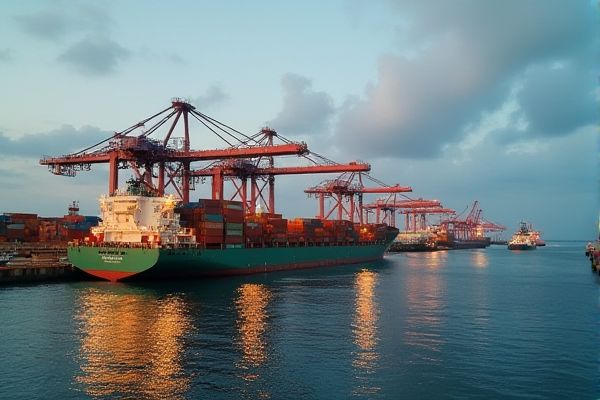
Ethiopia's strategic location in the Horn of Africa and membership in various trade agreements create abundant import and export job opportunities. A burgeoning agriculture sector, showcasing coffee, pulses, and livestock, enhances demand for skilled professionals in logistics, quality control, and supply chain management. The growth of textile, leather, and manufacturing industries also requires expertise in trade compliance, international marketing, and business development. Professionals fluent in foreign languages and familiar with local regulations have a competitive edge in navigating Ethiopia's dynamic trade landscape.
Job Description
Import and export jobs in Ethiopia offer a range of opportunities in various sectors, including agriculture, textiles, and manufacturing. Professionals in this field are responsible for managing the flow of goods across borders, ensuring compliance with local and international regulations, and negotiating contracts with suppliers and buyers. Strong understanding of Ethiopian trade laws, logistics, and market dynamics is essential for success in these roles. Your ability to adapt to changing trade environments and build relationships with key stakeholders can significantly enhance your career prospects in this growing market.
Requirement
Import-export jobs in Ethiopia require a solid understanding of trade regulations and logistics. Proficiency in the English language, along with knowledge of local languages, enhances communication with international partners. Familiarity with customs procedures and documentation is crucial for ensuring compliance and smooth transactions. A background in finance or business management can also be beneficial in navigating the complexities of import-export operations.
Salary and Perks Expected
Import-export jobs in Ethiopia offer competitive salaries that can vary significantly based on experience, education, and the specific role. Entry-level positions typically start around $400 to $600 per month, while experienced professionals can earn between $1,000 to $2,500. Besides salary, many companies provide additional perks such as performance bonuses, health insurance, and opportunities for international travel, which can enhance your overall compensation package. The growing trade sector in Ethiopia creates a dynamic job market, making it an appealing field for those looking to build a career in international trade.
Similar Job Names
- Import/Export Manager
- Logistics Coordinator
- Customs Compliance Officer
- Shipping Supervisor
- Supply Chain Analyst
- Freight Forwarder
- International Sales Representative
- Trade Compliance Manager
- Export Documentation Specialist
- Import Specialist
- Customs Broker
- Procurement Officer
- Warehouse Manager
- International Trade Consultant
- Export Sales Manager
Job Expectation Concept
Understanding job expectations in the import-export sector in Ethiopia is crucial for both employers and job seekers. Companies often look for candidates with strong knowledge of international trade regulations, logistics management, and market analysis relevant to Ethiopian goods. You should be aware of the need for language proficiency in English and possibly other languages to facilitate communication with international partners. Familiarity with local customs, tariffs, and export procedures can significantly enhance your competitiveness in this growing field.
Career Advantage and Weakness
Import-export jobs in Ethiopia offer significant career opportunities, particularly due to the country's strategic location and growing economy. You can benefit from a diverse range of industries, including agriculture, textiles, and minerals, which are crucial for international trade. A challenge in this field may include navigating complex regulations and limited infrastructure, which can impact efficiency and profitability. Developing strong communication and negotiation skills will be essential for success in overcoming these obstacles and maximizing potential growth.
Important Thing Must Know
Understanding the landscape of import-export jobs in Ethiopia is essential for anyone looking to pursue a career in this sector. The country offers a growing market with opportunities in various industries such as agriculture, textiles, and manufacturing. You will find that many companies seek professionals who are knowledgeable about international trade regulations and logistics. Language skills, particularly in English and Amharic, can enhance your competitiveness in the job market. Networking within local and international business communities can also open doors to more job opportunities in this dynamic field.
Alternative Career Options
Exploring alternative career options in Ethiopia's import-export sector can lead to a variety of rewarding paths. Opportunities include logistics management, where you can coordinate transportation and distribution of goods globally. Another option is customs brokerage, allowing for expertise in navigating trade regulations and ensuring compliance for international shipments. Additionally, starting a consultancy that offers market research and trade advice can leverage your knowledge of local and international markets effectively.
Companies List
- Ethiopian Airlines
- Ethiopian Shipping & Logistics Services
- DHL Ethiopia
- Ethiopian Coffee Exporters Association
- Africa Business Group
- EAGLE Import and Export
- CBE (Commercial Bank of Ethiopia)
- H&M Ethiopia
- KPMG Ethiopia
- Addis Ababa Chamber of Commerce
List of Ideal City
Ethiopia's booming trade sector makes cities like Addis Ababa, Dire Dawa, and Mekelle excellent locations for import-export job opportunities. Addis Ababa, as the capital, serves as a major hub due to its proximity to the international airport and various trade organizations. Dire Dawa, with its strategic location near the port of Djibouti, offers advantages for logistics and shipping activities. Mekelle, benefiting from a growing economy and increasing connectivity, presents a unique environment for businesses in the import-export industry.
 jobs-ethiopia.com
jobs-ethiopia.com